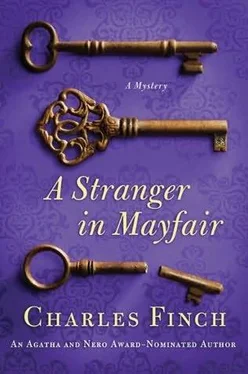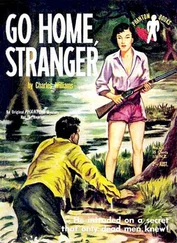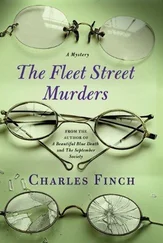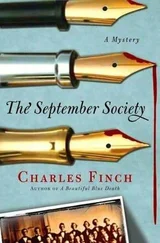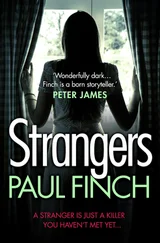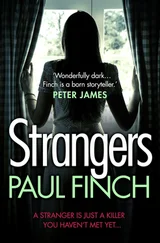Charles Finch - A Stranger in Mayfair
Здесь есть возможность читать онлайн «Charles Finch - A Stranger in Mayfair» весь текст электронной книги совершенно бесплатно (целиком полную версию без сокращений). В некоторых случаях можно слушать аудио, скачать через торрент в формате fb2 и присутствует краткое содержание. Жанр: Исторический детектив, на английском языке. Описание произведения, (предисловие) а так же отзывы посетителей доступны на портале библиотеки ЛибКат.
- Название:A Stranger in Mayfair
- Автор:
- Жанр:
- Год:неизвестен
- ISBN:нет данных
- Рейтинг книги:3 / 5. Голосов: 1
-
Избранное:Добавить в избранное
- Отзывы:
-
Ваша оценка:
- 60
- 1
- 2
- 3
- 4
- 5
A Stranger in Mayfair: краткое содержание, описание и аннотация
Предлагаем к чтению аннотацию, описание, краткое содержание или предисловие (зависит от того, что написал сам автор книги «A Stranger in Mayfair»). Если вы не нашли необходимую информацию о книге — напишите в комментариях, мы постараемся отыскать её.
A Stranger in Mayfair — читать онлайн бесплатно полную книгу (весь текст) целиком
Ниже представлен текст книги, разбитый по страницам. Система сохранения места последней прочитанной страницы, позволяет с удобством читать онлайн бесплатно книгу «A Stranger in Mayfair», без необходимости каждый раз заново искать на чём Вы остановились. Поставьте закладку, и сможете в любой момент перейти на страницу, на которой закончили чтение.
Интервал:
Закладка:
Lenox laughed. “Thank you. But what about the real thing?”
“Starling? I spent the morning on it. Something occurred to me.”
“Oh?”
“The method of attack-it was the same as killed Freddie Clarke.”
Lenox inhaled sharply. Of course it was. How could he have missed it? “Good Lord, you’re right. That must mean it was an attempt-a real attempt-to murder me.”
Dallington nodded gravely. “I think so, yes. Or else Ludo wanted again to transfer the blame away from himself. After all, a similar attack rather conveniently removes suspicion from someone we both saw didn’t do it.”
“And less conveniently away from Collingwood.”
“Precisely. In any event, I checked the alley.”
“Yes?”
“There was a different chunk of brick missing from it.”
“The same weapon.”
“Exactly.”
Lenox was still holding a blue book on corruption in the Indian army; he tossed it aside lightly, brooding on the new information.
Suddenly something occurred to him, and he stood up.
“What is it?” asked Dallington.
“I’ve thought of something. We need to go see Inspector Fowler.”
Chapter Forty-Four
Lenox had a wide enough acquaintance scattered through Scotland Yard that he could still walk through the building unchallenged. Several people eyed his bandage curiously, nodding cautious hellos to him, while others stopped to make some small joke about the Member of Parliament returning to his less reputable (or more reputable?) old haunt. Dallington, however, was stopped at a front desk, so Lenox went to see Fowler alone.
The door to his office was ajar. Lenox braced himself for a stream of vitriol before he knocked, and got about what he expected.
“Mr. Fowler?” he said, knocking the door and pushing it open.
“Mr. Lenox,” said Fowler with dangerous calm.
“I’m afraid it’s about the Starling case. We must speak about it.”
Fowler reddened. “I would ask you kindly not to tell me what I must do, sir!”
“I-”
“Really, this infernal and constant intrusion into official matters of the Yard cannot stand a moment longer! Good Lord, Mr. Lenox, do you have no sense of boundary? Of decorum? Of-”
“Decorum?”
“Yes, decorum!” He stood up behind his desk and began to cross the room with a menacing air. “You would do well to learn it, rather than presuming upon our past contact to make a nuisance of yourself.”
Then, rather quietly, Lenox said something that stopped him in his tracks. “I know you’re being bought off.”
The transformation in Fowler was extraordinary. He tried to bear up under the truth of the accusation for a moment, but it wasn’t possible. As he spoke initially a domineering, imposing man, he now drew inward, seemed to get smaller, looked tired and, most of all, old. Lenox was right. The burst of insight had come, funnily enough, from that unreadable blue book-the one on corruption.
“Of course not,” he muttered.
“The truth is in your face, Mr. Fowler-and I can think of no reason on earth why you would behave toward me as you have, when our relationship has always been cordial.”
“Paid? Don’t talk foolery.”
“Yes-by Ludo Starling, to look the other way.”
“No!”
“About a day after the murder, I would hazard. I’m here in part to speak to someone about it.”
The dam broke. “You can’t do that!” cried Fowler.
“Oh?” said Lenox coldly. “I understand that you were going to let an innocent man go to trial, Jack Collingwood-testify against him-perhaps even send him to hang. That I do understand.”
“No! It’s not true, I swear on Christ’s name. For God’s sake, shut the door, come in, come in.”
Lenox entered the office, reluctant to be alone with Fowler but certain the man had information. “He paid you, then? Ludo Starling?”
“Yes.”
Lenox had resisted heretofore believing that Ludo was the killer. Based both on the man’s mien (his rather hapless, debauched life was nonetheless lived without cruelty to others) and the facts (it was his son, for God’s sake), it had never seemed like the likeliest truth. Now the final barriers to his credulity fell away. How unknowable man is, he thought.
“I can’t believe you accepted money from him.”
“You don’t know the circumstances, Lenox.” The inspector sat back in his large oak chair, underneath a certificate praising his work from the Lord Mayor of London, and lit a small cigar. While it was clenched in his teeth he reached into a low drawer of his desk, pulled a bottle of whisky out, and poured two tots of it into a pair of dingy glasses. “Here you are,” he said, his voice weak. “Have a drink with me at least.”
“What circumstances?” asked Lenox.
Fowler smiled a bittersweet smile and took a puff on his cigar. “We’re very different men, you and I,” he said. “It’s all very well for you to take the high ground on a subject like money, knowing full well that in the normal run of life it would never come up between us. But do you know what my father did?”
“What?”
“He was a pure collector.” Lenox grimaced unintentionally, and Fowler laughed. “Not so nice, is it? No, it wasn’t then.”
Lenox knew of pure collectors; they had formed part of his reading on cholera. They were men-very poor men-who scavenged for dog and human waste, which they then sold to farms. It took extremely long workdays in extremely unpleasant places to make a living at it.
“I don’t understand the connection of that to Ludo Starling,” said Lenox.
“No; you wouldn’t. While I was using tea leaves four times to get all the flavor of them, living in a house that smelled of-well, why mince words? It smelled of shit! Yes, you can make all the unpleasant faces you want, but while I was living there you were in your father’s house, looked after by nannies, eating off of silver, learning about what your old ancestors did at, at Agincourt…no, we’re very different, you and I.”
Lenox felt on uncertain ground now. This was a tender spot for him. Money was the great unexamined area of his conscience, in a way. “But you took bribery, Grayson, and you have a job now. You’re not a pure collector. That was your father.”
The look on Fowler’s face was contemptuous. “You know about it, do you? Did you know that I have nine brothers and sisters, and that of us all I’m the only one with a decent job? That I’ve given them nearly every cent I earned to keep them in food and clothes, to try to educate their children, and that four of them have died anyway, of that blasted cholera? You have a brother, I know. Can you imagine burying him, Mr. Lenox?”
“No.”
“I have my house, Mr. Lenox-a modest enough affair, but it took me ten years to buy it. Beyond that, nothing except my next wage packet from the Yard…and last year I found out that I’m getting too old to stay on here.”
“What?”
“There’ll be my pension, but that’s only enough for tea and toast. So yes, I’ve taken a few pounds here and there. Always in cases when I thought I knew better than the law. Can you judge me for it?”
The answer was that he couldn’t. No. It was possible of course that Fowler was spinning a story for him, playing for sympathy, but something final and confessional in the man’s air convinced Lenox it was all true.
“Well, but what about Collingwood?” asked Lenox with a struggle.
“He would have been free next week.”
“Why next week?”
But Fowler was in his own world. He stood up and looked through the window, which was flung with a few raindrops. “Do you know when I joined the Yard?” he said. “It was the best thing that ever happened to me.”
Читать дальшеИнтервал:
Закладка:
Похожие книги на «A Stranger in Mayfair»
Представляем Вашему вниманию похожие книги на «A Stranger in Mayfair» списком для выбора. Мы отобрали схожую по названию и смыслу литературу в надежде предоставить читателям больше вариантов отыскать новые, интересные, ещё непрочитанные произведения.
Обсуждение, отзывы о книге «A Stranger in Mayfair» и просто собственные мнения читателей. Оставьте ваши комментарии, напишите, что Вы думаете о произведении, его смысле или главных героях. Укажите что конкретно понравилось, а что нет, и почему Вы так считаете.
